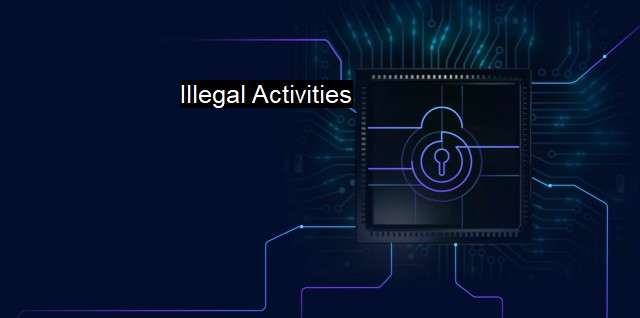What are Illegal Activities?
The Pervasive Threat of Cybersecurity: Illegal Activities, Malware, and the Critical Need for Antivirus Software
Within the world of cybersecurity and antivirus solutions, the term "illegal activities" refers to a vast array of unscrupulous actions performed by individuals or groups with ill-intent, typically looking for monetary gains or other types of benefits, such as gathering sensitive information for unethical purposes. These activities may include things such as hacking, phishing schemes, ransomware attacks, malware insertion, exploitation of vulnerable systems, and so on.Hacking is one of the most renowned illegal activities in cybersecurity. It involves gaining unauthorized access to computer systems to steal, alter, or delete information. Hackers might employ diverse techniques, using malware or exploiting network vulnerabilities to break into networks or individual devices. They can potentially access sensitive data like bank details, personal identification information, intellectual property, and corporate secrets.
Phishing is another commonly encountered illegal activity. It involves tricking individuals into revealing sensitive information like passwords or financial information. Phishing attacks often arrive in the form of deceptive emails, text messages, or websites, designed to look like they're from a trusted source such as a bank or a known contact.
Ransomware attacks are a particularly harsh kind of illegal activity, where attackers inject malicious software into a victim's system to encrypt their data, rendering it inaccessible. Eventually, they demand a ransom, typically in the form of untraceable cryptocurrencies like Bitcoin, to decrypt the data.
Malware refers to a range of intrusive software, designed to infect a specific device or an entire network, hindering its performance or stealing data. Examples of malware include viruses, worms, Trojans, spyware, and adware. Virus and Trojans work subtly by attaching themselves to legitimate files or programs, while worms spread rapidly across networks, causing widespread damage.
Illegal activities may take advantage of vulnerabilities in a system’s software. These vulnerabilities are the ‘loopholes’ or ‘weak points’ that allow an attacker to gain unauthorized entry into a computer system/network. In computer virus terms, this concept is vaguely analogous to the biological 'patient zero,' that first point of infection from which the virus proliferates.
Illegal activities can lead to severe consequences, both tangible and intangible. Tangible losses include financial loss from stolen money or from damage caused to systems and networks. Intangible losses could relate to reputation damage due to data breaches and the theft of personal or sensitive data of clients, resulting in erosion of trust among customers and stakeholders.
The deployment of antivirus software greatly helps in combating these illicit activities. These powerful security tools, along with firewalls and other cybersecurity measures, offer frontline defense against many common types of cyber threats. They are capable of detecting, isolating, and neutralizing hazards like viruses, malware, or ransomware before they can cause any malicious harm.
Continuously updating the antivirus software is of prime importance since cyber threats are constantly evolving. Equally critical is promoting cybersecurity awareness among all users because preventative actions such as having strong passwords, being wary of phishing attempts, and maintaining privacy of sensitive information go a long way in ensuring security in the cyber world.
Unfortunately, despite the advancements made illegal activities in this domain continue to be imposing threats due to their dynamic nature, constant evolution, and the proliferation of increasingly sophisticated malicious tactics. Fear of these threats should not deter us from understanding them and fortifying ourselves with the desired level of cybersecurity hygiene, thus ensuring a safer digital experience.

Illegal Activities FAQs
What are the types of illegal activities in cybersecurity?
There are various types of illegal activities in cybersecurity, such as hacking, cyberstalking, phishing, identity theft, malware distribution, ransomware attacks, and spreading illicit content.How can illegal activities harm my computer?
Illegal activities can harm your computer in multiple ways, such as stealing your personal and financial data, corrupting your files, compromising your system security, and even damaging your hardware.Can antivirus software protect against all types of illegal activities?
Antivirus software can protect your computer against many types of illegal activities, but it cannot guarantee complete protection. Cybercriminals are constantly developing new techniques to evade detection, so it's crucial to keep your antivirus software updated and use other cybersecurity measures like firewalls and backup systems.What should I do if I suspect someone of engaging in illegal activities on my computer?
If you suspect someone of engaging in illegal activities on your computer, you should immediately disconnect from the Internet and seek help from a trusted cybersecurity professional or law enforcement agency. Do not attempt to confront the individual yourself, as this could put you at risk of physical harm or legal consequences.| | A | | | B | | | C | | | D | | | E | | | F | | | G | | | H | | | I | | | J | | | K | | | L | | | M | |
| | N | | | O | | | P | | | Q | | | R | | | S | | | T | | | U | | | V | | | W | | | X | | | Y | | | Z | |
| | 1 | | | 2 | | | 3 | | | 4 | | | 7 | | | 8 | | |||||||